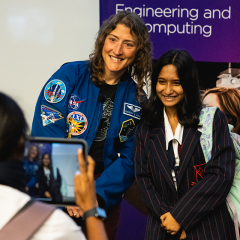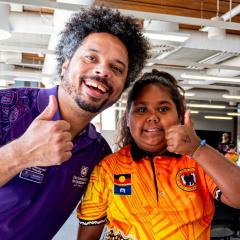The University of Queensland could soon be the first university to fly a student-built rocket and scientific payload into space next year.
UQ Space is designing and building ‘Project Asteria’, a rocket that will zoom past the Kármán Line, 100 kilometres above sea level, reaching speeds greater than Mach-5.
With support from UQ aerospace engineering experts and industry partners including Queensland-based Black Sky Aerospace, the 90-strong student team hopes to set a new world record.
UQ Space Managing Director, engineering and arts student Myrthe Snoeks, said the team had been working towards this ambitious goal despite delays caused by the global COVID-19 pandemic.
“We started developing the rocket in 2019, and we are now planning and undertaking static testing and sub-orbital launch preparations before our official launch next year,” Ms Snoeks said.
“The UQ Space team has achieved so much already, having taken out the top position in Australia for competitive university rocket launches in 2019, only one year after establishing the team.
“While 2020 has presented some additional challenges to our progress, we haven’t given up – we absolutely intend on achieving this goal with the help of our supporters.”
UQ Space will be using the Beyond the Blue Aerospace launch and test facility near Goondiwindi in western Queensland, known as ‘Funny Farm Space’.
This will be one of the first industry collaborations to take advantage of the $3 million commitment from Black Sky Aerospace and Beyond the Blue Aerospace to encourage space ventures from Queensland.
The launch facility is Australia’s only sub-orbital facility permitted to fly through and above controlled airspace and was home to Australia’s first commercial payload rocket launch by Black Sky Aerospace in 2018.
Black Sky Aerospace Director Blake Nikolic said there were real benefits to working on Project Asteria.
“Together we are advancing Australia’s space capabilities and showing the world that we’re here and we’re ready,” Mr Nikolic said.
“Working with these bright and committed students also helps us as we develop our internship program in this new industry, and provides our future employees with practical knowledge-based learning.”
The team plans to travel to Goondiwindi in the coming months for their first static test fire of Project Asteria.
Media: UQ Communications, Genevieve Worrell, g.worrell@uq.edu.au, +61 408 432 213; Black Sky Aerospace, info@bsaero.spaceinfo@bsaero.space, +61 730 776 861.



